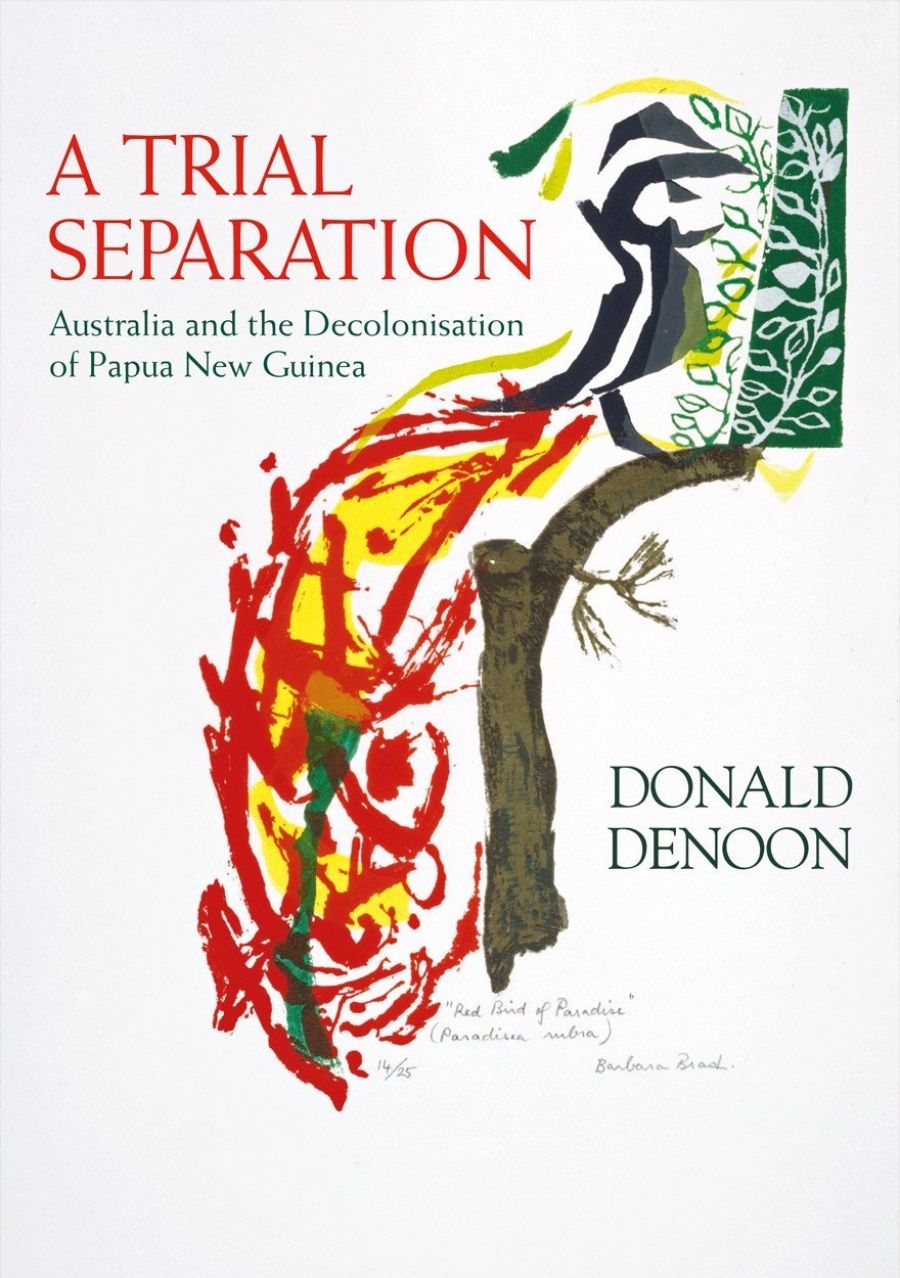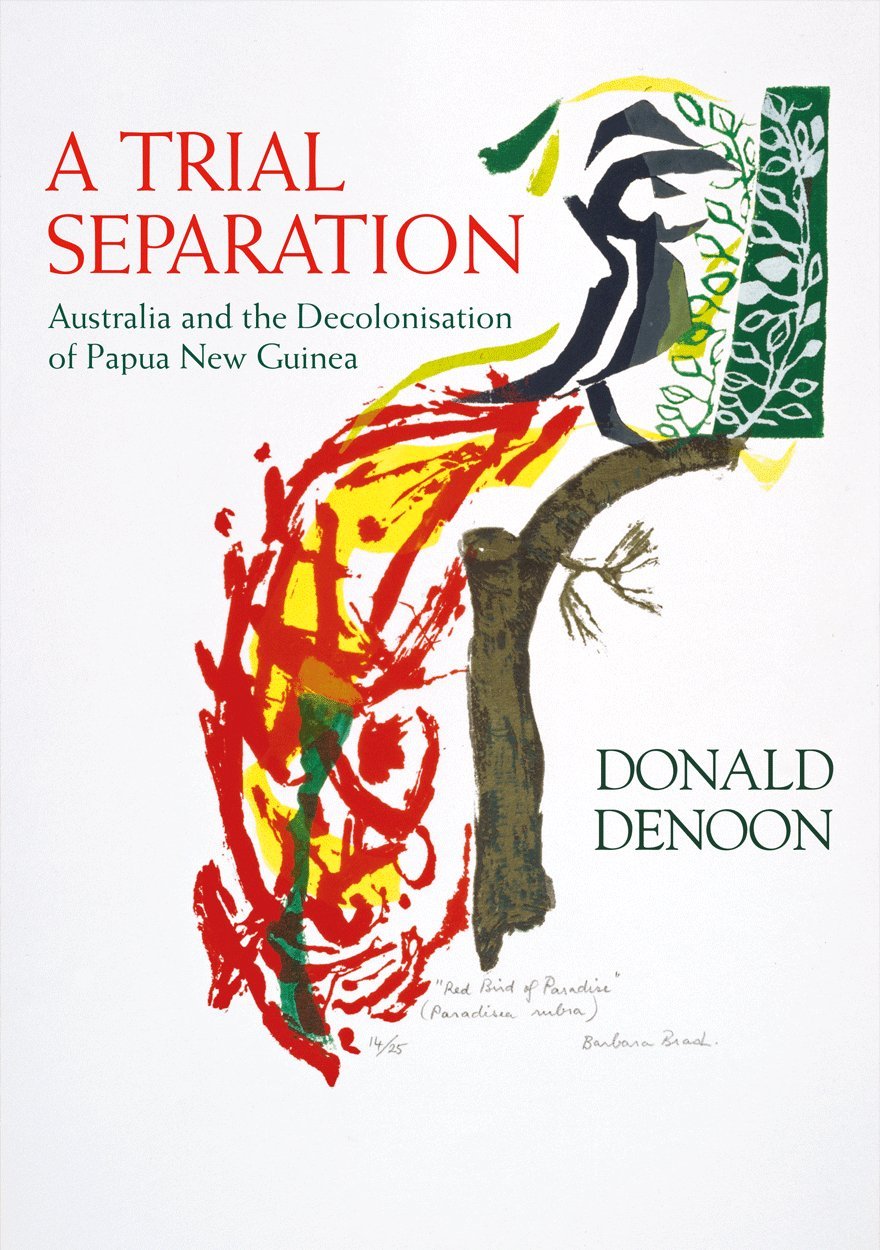
- Free Article: No
- Contents Category: Australian History
- Review Article: Yes
- Article Title: Conundrum in PNG
- Online Only: No
- Custom Highlight Text:
This book is a milestone in the historiography of Australia and Papua New Guinea. It puts paid to sterile debates about whether PNG’s independence came too early. ‘Decolonisation,’ Professor Donald Denoon concludes, ‘is by no means complete and independence is a work in progress.’ What happened on 16 September 1975 was the beginning of a ‘trial separation’: ‘Australian rule over the territory was not a marriage made in heaven, and it could never be consummated by full integration. Yet those countries are so close in so many ways that the divorce cannot easily be made absolute.’
- Book 1 Title: A Trial Separation
- Book 1 Subtitle: Australia and the decolonisation of Papua New Guinea
- Book 1 Biblio: Pandanus, $45 pb, 228 pp
- Book 1 Cover Small (400 x 600):

- Book 1 Cover (800 x 1200):

There is an orthodox view in Australia – mainly pro-mulgated by the dominant right of Australian politics, and increasingly echoed in PNG – which condemns what its proponents judge to be the failure of the entire independence project. This simplistic interpretation depicts the devil in the picture as Gough Whitlam. When he became prime minister in 1972, it is claimed, Whitlam’s reckless insistence on in-dependence for PNG within the lifetime of the new government laid the foundations for all the negative things that have happened since. Only a few PNG hotheads – untested would-be leaders mouthing fashionable anti-colonialist slogans – were demanding independence at once.
What Denoon carefully explains is that there were other compelling pressures at work that made Australia’s role in PNG invidious and ultimately untenable. A number of United Nations member states were championing a variety of anti-colonialist causes at that time. Australia was an easy target for doctrinaire attacks emanating from these sources. It was true that Papua had been a languidly administered colony and that the Trust Territory of New Guinea had often been amateurishly administered by the Australians. Some of the UN criticisms hit the mark. But the criticisms built up significant international pressure on Australia to quit PNG without their advocates showing any genuine concern for PNG’s post-independence prospects.
At the same time, there were fissiparous tendencies accruing in PNG itself. Some Papuan nationalists were demanding Australian citizenship, if not Australian statehood for their region. Some educated Tolais on the Gazelle Peninsula, and some radical Bougainvilleans, were at odds with their putative fellow PNG citizens, some even proposing autonomy (or sovereignty) for their regions. Many inside and outside the less ‘developed’ Highlands regions were worried about what a post-independence PNG would be like for Highlanders and for those to whom they were to be joined in the new PNG state. There was no anti-colonialist nationalism drawing the country together in a unified rejection of the Australian administration. The Australians could never have kept a colonially contrived lid on these building heads of steam. A circuit-breaker was surely needed, and that had to be independence.
In confronting these problems, Whitlam had little room to manoeuvre as he contemplated the PNG conundrum he had inherited from previous governments. Denoon makes it clear that neither Whitlam nor his territories minister, Bill Morrison, were responsible for setting the independence agenda. Ministers in previous coalition governments had set that course – especially, though not exclusively, Andrew Peacock, in the declining months of the McMahon government. Peacock was convinced that self-government had to occur sooner rather than later, with independence to follow. Whitlam was following an agenda not of his own making.
Denoon is scrupulous to the point of fastidiousness in documenting the ups and downs of PNG’s political and economic development since 1975. He achieves this, sometimes by understating his own feelings about the successes and some appalling disasters that have been the lot of PNG since it decoupled from Australia late in 1975. He draws attention to some laudable achievements. The first (Somare) government successfully cobbled together a new constitution. It managed to renegotiate a somewhat better Bougainville mine agreement than had originally been devised by the Australians on short-sighted terms that were both insensitive and unjust to the people on whose land the mine was constructed. (This insensitivity was to prove fatal down the track.) Economic policies were put in place that, for a time, were sensible and productive. Papua New Guineans with little experience and not much help from the outside world rose to the occasion and acquitted themselves admirably.
But issues that had not been properly resolved before independence came bubbling up to undo the achievements of the first decade of independence. By the 1990s things were rapidly going downhill. Corruption had set in; incompetent wantoks (tribal or clan cronies) were placed in positions of power by stupid and venal ministers; Bougainville erupted into a prolonged and brutal civil war; law and order broke down seriously in the Highlands and major urban centres. Today, Port Moresby is judged to be the worst city in the world. PNG’s economy is all but flat; an HIV/AIDS pandemic is looming; other health crises are gathering in the wings; violence abounds; literacy rates are plummeting. Some think PNG is becoming a failed state. How Australia and PNG work together over the next three decades will be critical in determining whether failed state status is avoided or not.
A Trial Separation is a wise and lucid narrative by an eminent historian. But Donald Denoon would be the first to acknowledge that there is now a critical need for Papua New Guinean interpretations of the processes and realities that he has so scrupulously set out in this foundational work.


Comments powered by CComment